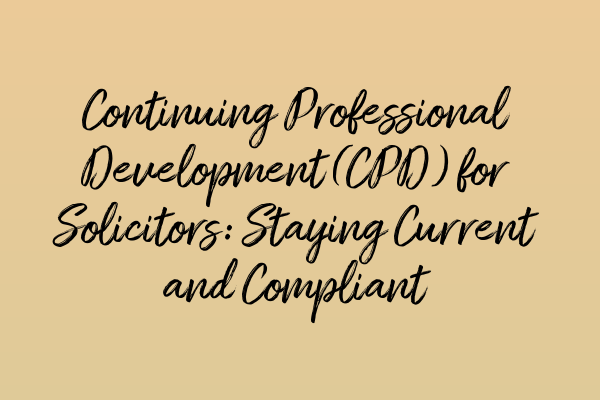Continuing Professional Development (CPD) for Solicitors: Staying Current and Compliant
As a solicitor, staying up-to-date with the ever-evolving legal landscape is crucial to both your professional growth and the quality of service you provide to your clients. Continuing Professional Development (CPD) plays a vital role in ensuring you stay current and compliant in your practice. In this article, we will explore the importance of CPD for solicitors and provide you with valuable tips and insights.
Why is CPD important?
CPD is not just a requirement imposed by the Solicitors Regulation Authority (SRA), but a fundamental aspect of being a competent and credible legal professional. It allows solicitors to enhance their knowledge, develop new skills, and stay informed about legal advancements and changes.
By engaging in CPD activities, solicitors can:
- Stay abreast of legislative changes and updates
- Improve their legal knowledge and technical skills
- Enhance their professional competence
- Stay compliant with the SRA regulations
- Provide better service to clients
Types of CPD activities
CPD for solicitors encompasses a wide range of activities that contribute to their professional development. These activities can include:
- Attending legal seminars, conferences, and webinars
- Participating in workshops and training programs
- Undertaking relevant courses or obtaining additional qualifications
- Reading legal journals, articles, and books
- Mentoring or being mentored by other legal professionals
It is essential to engage in a diverse range of CPD activities to ensure a well-rounded and comprehensive professional development journey. This variety not only helps solicitors stay updated with legal developments but also enables them to acquire new skills and perspectives that can benefit their clients and legal practice.
Planning and recording CPD
Effective planning and recording of CPD activities is crucial to maintain compliance with the SRA regulations. It is recommended that solicitors devise a detailed CPD plan at the beginning of each year, outlining their learning goals and the activities they intend to undertake.
When recording CPD activities, solicitors should document the date, activity details, and the number of CPD hours devoted to each activity. This information will be required for the SRA’s annual declaration of compliance. Integrating a robust system to track and record CPD activities, whether through specialized software or spreadsheets, can greatly simplify this process.
Utilizing technology for CPD
In today’s digital age, technology has revolutionized the way solicitors can engage in CPD activities. Online platforms, webinars, and e-learning platforms provide convenient and accessible options for solicitors to expand their knowledge and skills.
Furthermore, technology can also help solicitors stay informed about legal updates and changes. Subscribing to legal blogs, podcasts, and online publications can ensure solicitors receive regular updates on relevant legal topics, making it easier to stay current with their CPD requirements.
Making CPD enjoyable and interactive
Engaging with CPD activities should not be seen as a burdensome task but an opportunity to learn, grow, and connect with fellow legal professionals. Try to choose activities that align with your interests and areas of practice.
Additionally, consider joining professional forums, social media groups, or legal associations where you can connect with other solicitors and exchange ideas and insights. Participating in discussions and sharing knowledge can make your CPD journey more interactive and enjoyable.
Conclusion
Continuing Professional Development (CPD) is an essential part of maintaining professional competence as a solicitor. By engaging in diverse CPD activities, solicitors can stay current, compliant, and provide the best possible service to their clients. So, embrace the opportunities presented by CPD, utilize technology, and stay committed to lifelong learning. Together, we can thrive in the dynamic world of law.
Related Articles:
- SQE Prep: Tips and Tricks to Excel in Criminal Law
- Cross-Examination Techniques: Mastering the Art of Questioning
- Private Prosecutions: Exploring Non-Governmental Prosecutions in Criminal Cases
- Ethical Challenges in Criminal Defence: Navigating Dilemmas
- Assault and Battery Laws: Understanding the Legal Parameters


Leave a Reply